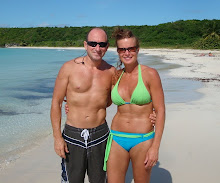While the U.S. Agency for Toxic Substances and Disease Registry recognized that there is a higher incidence of cancer and other health problems on Vieques island compared with Puerto Rico, it found that there is no proof the problem is linked to U.S. military activity in the area.
The long-awaited preliminary report, issued on Thursday, was widely criticized by Puerto Rican officials and Vieques residents long resentful of health problems that they blame on the Navy, which used the tiny island as a bombing range for six decades.
The 361-page report by the U.S. Agency for Toxic Substances and Disease Registry, part of the Department of Health and Human Services, nearly concludes a federal investigation into health problems on Vieques. In 2009, the agency pledged to review a much criticized 2003 report that found there was essentially no health risk from the bombing range, which was closed that year.
But critics point to a study by a former Puerto Rico health minister that found cancer rates on Vieques were 27 percent higher than on the main island. That study said there are no significant lifestyle differences between the two groups, and said it also detected a higher prevalence of other illnesses, including diabetes, asthma and epilepsy. And activists say that they will continue to fight for those who are ill.
"We have people from Vieques who got sick through exposure that could have been prevented if the agency had done its job," said local scientist Arturo Massol, who was invited to consult on the review but said he was never contacted. "As a result of that reality, this agency, which has dragged its feet, has become in part responsible for the damage to their health."
We believe that Viequenses are right to be concerned about their health, and we are proposing certain actions to ensure their health.
- Christopher Portier, director of the U.S. Agency for Toxic Substances and Disease Registry
U.S. officials maintain in the new report that the scientific data presented about island health problems was inadequate, limited and flawed, making it "difficult and uncertain" to interpret findings regarding chronic diseases. The report said elevated levels of certain chemicals in people's bodies could be attributed to causes other than military activity.
The agency suggested U.S. officials could work with the Puerto Rico government to obtain additional samples and keep track of health conditions on Vieques.
Vieques Mayor Evelyn Delerme said the report lacked credibility and offered no new information.
"It appears that this report is intended to be 'inconclusive by design,'" she said in a statement.
Pedro Pierluisi, Puerto Rico's nonvoting in the U.S. House of Representatives, said he would request a congressional hearing to discuss the report's findings and obtain an update on the cleanup of unexploded munitions that began in 2005.
He called the report flawed.
"The health problems of Vieques residents have long been recognized," he said. "You have to ask yourself why the federal government has not made the effort to obtain information that will allow it to reach responsible conclusions."
SUMMARY
The 361-page report by the U.S. Agency for Toxic Substances and Disease Registry nearly concludes a federal investigation into health problems on Vieques, but critics said they would continue to fight for those who are ill.
U.S. Rep. Steve Rothman, a Democrat from New Jersey, said the report did not address concerns about what he called alarmingly high rates of serious and disabling health care problems in Vieques.
"I am disappointed that the ... report provided more questions than answers," Rothman said. "It is astonishing that the ATSDR seems to still hold that decades of bombing on the island by the U.S. Navy with military ordnance pose no harmful health effects."
In April, Rothman proposed the Vieques Recovery and Development Act, which calls for creation of a toxic research center and hospital on the island among other things.
One of the report's key findings is that some Vieques residents are exposed to high levels of mercury from eating fish. That problem is not linked to previous military activity, said Portier, who suggested people eat fish low in mercury.
The report does warn that some areas of the former bombing range still present a risk.
"Recently collected data ... demonstrate the remaining potential for localized contamination, which, if people frequented those areas, could be of health concern," it stated.
The Navy has said its forces accidentally fired 263 rounds of ammunition tipped with depleted uranium on the Vieques range in 1999, violating federal law.
The bombing range closed in 2003 following years of protests about environmental risks and the 1999 killing of a Puerto Rican civilian guard by an errant bomb.
Hermogenes Marrero, a 59-year-old retired U.S. Marine sergeant living in Puerto Rico, blames his colon cancer and other ailments on toxins that he says he was exposed to while working at Vieques from 1970 to 1972.
He said he was surprised by the new report and accused the government of hiding information.
"When the Navy says one does not become sick from that, that is not true," said Marrero, who filed a claim against the U.S. government in 2002 and is still waiting for it to be resolved.
Also pending is a lawsuit filed against the federal government in September 2007 that names 7,100 claimants from Vieques, an island of about 10,000 people.
Mississippi lawyer John Eaves Jr. said the new report recycles conclusions from the 2003 report and demonstrates a lack of credibility.
"We're very disheartened," he said. "We thought the agency was truly going to take a fresh look as was promised."
The Agency for Toxic Substances and Disease Registry is seeking public comment through March before issuing a final report that would include recommendations for unidentified future work to be done in Vieques.
Based on reporting by the Associated Press.
Read more:
latino fox news
also of interest:
time magazine

























































